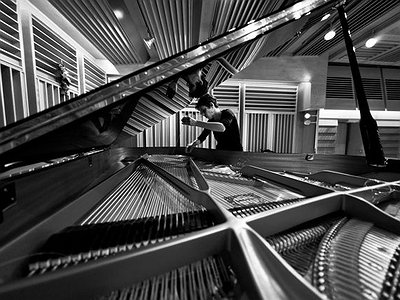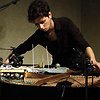Free to roam
Purportedly, John Stevens of the Spontaneous Music Ensemble had two basic rules to playing in his ensemble: (1) If you can't hear another musician, you're playing too loud, and (2) if the music you're producing doesn't regularly relate to what you're hearing others create, why be in the group. What's your perspective on this statement and how, more generally, does playing in a group compare to a solo situation?
I think these are two very true statements, but of course they can also depend on the kind of music you are playing. There can be other rules you decide on as a group. Generally, I find playing solo both challenging and enjoyable, coming up with all the material, ideas, structure yourself - but it's also freedom to follow through with your ideas.
Some people see recording improvised music as a problem. Do you?
No. It's just two different experiences, the recording of say, a live concert or being there. The process of making recordings, for me, involves both improvising and then composing a piece, by which I mean the editing and mixing process to me, is akin to composing. The other approach is more purely a document of the moment, which can be equally interesting.
In the 20th century, the relationship between music and other forms of art - painting, video art and cinema most importantly - has become increasingly important. How do you see this relationship yourself and in how far, do you feel, does music relate to other senses than hearing alone?
Playing piano is a very physical experience for me. I often enjoy the movement that creates the sounds as much as the sound itself, it's not separable. As for other forms of art, I draw a lot of inspiration from painters, artists, photography, poetry - on a different level than from music, but it's as strong.
In how much, do you feel, are creative decisions shaped by cultural differences - and in how much, vice versa, is the perception of sound influenced by cultural differences?
I imagine it matters a lot - where you grow up, what surrounds you, what languages you speak, nature. But then that's very hard for me to answer or to know exactly.
Do you feel it important that an audience is able to deduct the processes and ideas behind a work purely on the basis of the music? If so, how do you make them transparent?
I don't think it's necessary for an audience to analyse the music they are hearing as it's happening. Listening can happen on so many levels, that’s what's beautiful about it. On the other hand, clarity is something I am definitely trying to achieve when I play. Clear statements or decisions are important from a musical point of view.
Usually, it is considered that it is the job of the artist to win over an audience. But listening is also an active, rather than just a passive process. How do you see the role of the listener in the musical communication process?
Yes, I agree. The audience plays an active role, they transform the sounds by listening to them. It's a strong relationship, between audience and musicians, even if you can't explain it or put your finger on what it is that's happening between the two, it matters. Having said that, I don't play music to please an audience or provoke it, it happens on a different, more subtle or, if you like, more mystical level.
Music-sharing sites and -blogs as well as a flood of releases in general are presenting both listeners and artists with challenging questions. What's your view on the value of music today? In what way does the abundance of music change our perception of it?
Music is a very personal thing and the commercial and economic changes you mention do not influence the value of music for me. I really don't know how it is for others.
Please recommend two artists to our readers which you feel deserve their attention.
David Brown from Melbourne, Australia is an extraordinary musician, a guitarist with seemingly endless ideas and colours.
Hermione Johnson from Auckland, NZ, a pianist with an incredible flow and energy in her music.
Explore Magda's music at her website magdamayas.jimdo.com






